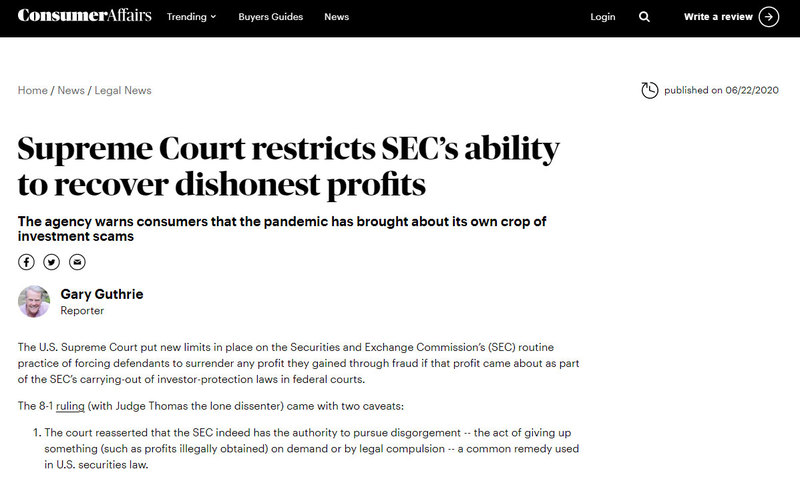Supreme Court restricts SEC’s ability to recover dishonest profits
The U.S. Supreme Court put new limits in place on the Securities and Exchange Commission’s (SEC) routine practice of forcing defendants to surrender any profit they gained through fraud if that profit came about as part of the SEC’s carrying-out of investor-protection laws in federal courts.
The 8-1 ruling (with Judge Thomas the lone dissenter) came with two caveats:
-
The court reasserted that the SEC indeed has the authority to pursue disgorgement -- the act of giving up something (such as profits illegally obtained) on demand or by legal compulsion -- a common remedy used in U.S. securities law.
-
The ruling puts a cap on the scope of how much can be sought by means of disgorgement. The new limit can be no more than the net profits of the supposed misconduct, and as a general rule, disgorgement should go to investors.
“Today’s decision allows us to continue to strip wrongdoers of their ill-gotten gains and return money to its rightful owners,” an SEC spokesperson said.
Origins of the decision
The case dates back to 2016 when the SEC brought civil action against husband and wife Charles Liu and Xin “Lisa” Wang. The couple amassed a $27 million fortune by raising money from foreign investors under the pretext that the investors would be helping to capitalize a cancer treatment center and that their investment would lead to them procuring U.S. visas under the EB-5 Immigrant Investor Visa Program.
The EB-5 program offers a way for eligible Immigrant Investors to become lawful permanent residents (aka “green card” holders) if they invest a minimum of $900,000 toward subsidizing a U.S. business that will employ at least 10 American workers.
Unfortunately, the immigrants are focused on citizenship and have little control over the investment process, even though they themselves bear the burden of compliance with program requirements.
In their promotion materials, the pair hawked that the project would create some 4,500 new jobs and have a substantial impact on the local economy. But 18 months into the couple’s offer and investment collection, the SEC discovered that no construction had taken place at the proposed site. Meanwhile, Liu had transferred $11 million in investor funds to three firms in China and diverted another $7 million to his and his wife's personal accounts.
With those facts in hand, the SEC ordered the couple to disgorge $27 million, the amount they raised -- an amount Liu and Wang felt was well beyond the $8 million a trial judge had determined they had gained from their scheme.
Gregory Rapawy, a lawyer for Liu and Wang, had argued that a court of equity “will not inflict a penalty; it will make the person no worse off than they were had they not committed the wrong.” He said he was pleased the court “clarified that traditional equitable principles limit the SEC’s authority to seek an award of net profits for the benefit of victims.”
The SEC warns the public of coronavirus-related investor scams
The Liu and Wang case is a good reminder that investing consumers should pay particular notice to any claims that a company’s products or services will be used to help stop the coronavirus outbreak.
“Fraudsters often use the latest news developments to lure investors into scams,” the SEC reminds consumers. “We have become aware of a number of Internet promotions, including on social media, claiming that the products or services of publicly-traded companies can prevent, detect, or cure coronavirus, and that the stock of these companies will dramatically increase in value as a result.”
What should consumers be on the lookout for? The SEC says the coronavirus-related promotions regularly take the form of so-called “research reports” and make the play of a specific “target price.”
“We urge investors to be wary of these promotions, and to be aware of the substantial potential for fraud at this time,” the agency said.
Mentions
States
- New York
Securities Disclaimer
This website is for informational purposes only and does not constitute an offer or solicitation to sell shares or securities. Any such offer or solicitation will be made only by means of an investment's confidential Offering Memorandum and in accordance with the terms of all applicable securities and other laws. This website does not constitute or form part of, and should not be construed as, any offer for sale or subscription of, or any invitation to offer to buy or subscribe for, any securities, nor should it or any part of it form the basis of, or be relied on in any connection with, any contract or commitment whatsoever. EB5Projects.com LLC and its affiliates expressly disclaim any and all responsibility for any direct or consequential loss or damage of any kind whatsoever arising directly or indirectly from: (i) reliance on any information contained in the website, (ii) any error, omission or inaccuracy in any such information or (iii) any action resulting therefrom.




